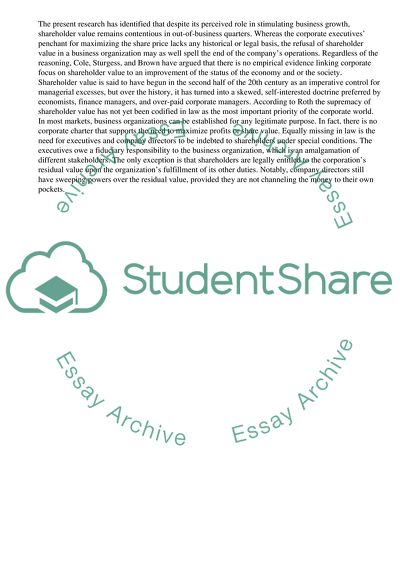Cite this document
(“Failure of Shareholder Value Essay Example | Topics and Well Written Essays - 2000 words - 1”, n.d.)
Failure of Shareholder Value Essay Example | Topics and Well Written Essays - 2000 words - 1. Retrieved from https://studentshare.org/business/1814361-the-pursuit-of-shareholder-value-included-setting-demanding-return-targets-for-capital-employed-which-most-of-the-ftse-100-and-sp500-companies-failed-to-achieve-critically-examine-the-underlying-cause-of-the-failure
Failure of Shareholder Value Essay Example | Topics and Well Written Essays - 2000 words - 1. Retrieved from https://studentshare.org/business/1814361-the-pursuit-of-shareholder-value-included-setting-demanding-return-targets-for-capital-employed-which-most-of-the-ftse-100-and-sp500-companies-failed-to-achieve-critically-examine-the-underlying-cause-of-the-failure
(Failure of Shareholder Value Essay Example | Topics and Well Written Essays - 2000 Words - 1)
Failure of Shareholder Value Essay Example | Topics and Well Written Essays - 2000 Words - 1. https://studentshare.org/business/1814361-the-pursuit-of-shareholder-value-included-setting-demanding-return-targets-for-capital-employed-which-most-of-the-ftse-100-and-sp500-companies-failed-to-achieve-critically-examine-the-underlying-cause-of-the-failure.
Failure of Shareholder Value Essay Example | Topics and Well Written Essays - 2000 Words - 1. https://studentshare.org/business/1814361-the-pursuit-of-shareholder-value-included-setting-demanding-return-targets-for-capital-employed-which-most-of-the-ftse-100-and-sp500-companies-failed-to-achieve-critically-examine-the-underlying-cause-of-the-failure.
“Failure of Shareholder Value Essay Example | Topics and Well Written Essays - 2000 Words - 1”, n.d. https://studentshare.org/business/1814361-the-pursuit-of-shareholder-value-included-setting-demanding-return-targets-for-capital-employed-which-most-of-the-ftse-100-and-sp500-companies-failed-to-achieve-critically-examine-the-underlying-cause-of-the-failure.


